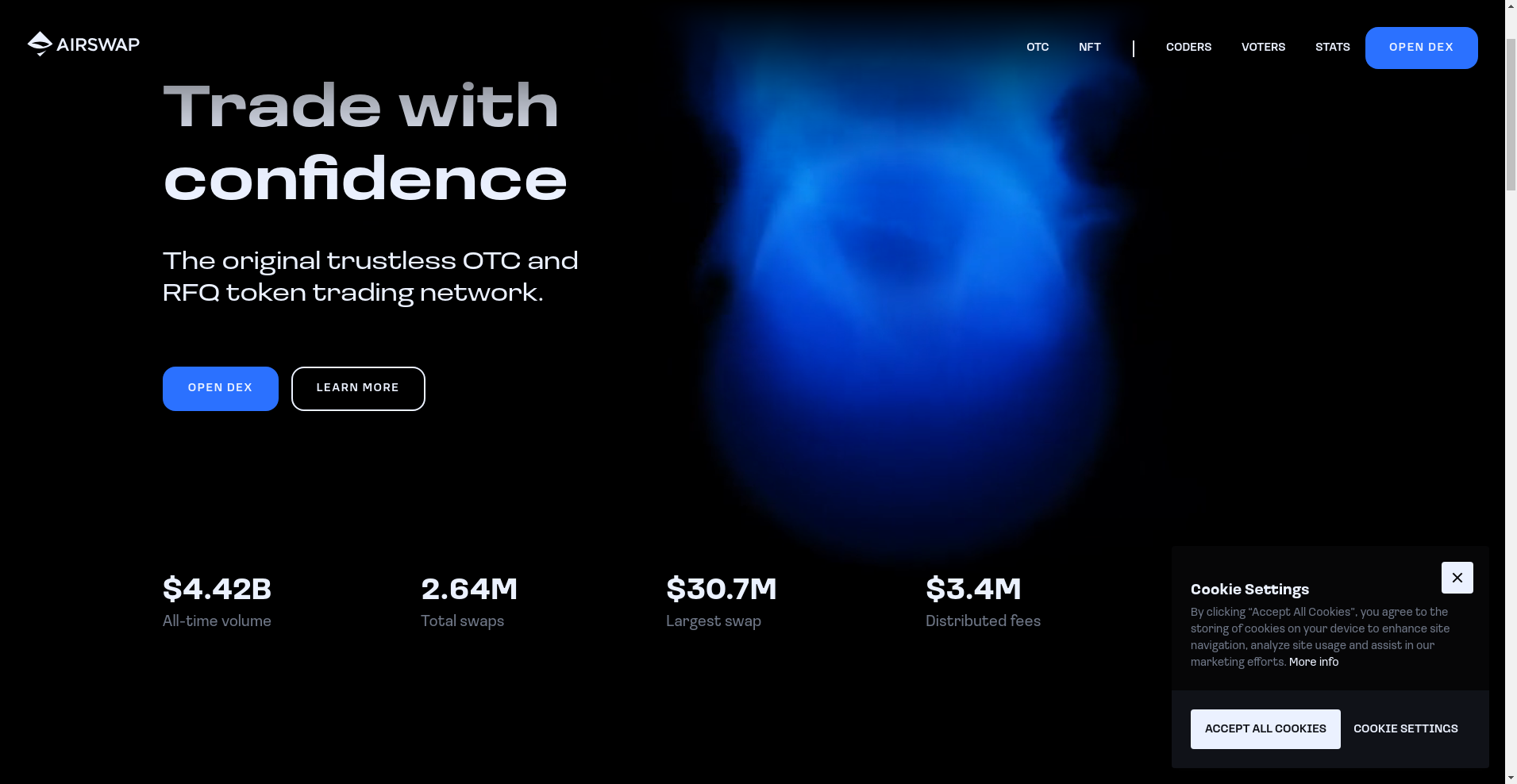AirSwap ($AST) Review: A Data-Driven Legitimacy and Risk Assessment

Project Overview
AirSwap is positioned as "the original trustless OTC and RFQ token trading network." Launched in 2017, it aims to offer a decentralized platform that facilitates peer-to-peer (P2P) token swaps without relying on traditional intermediaries. The core proposition emphasizes trustless, efficient, and secure trading, leveraging off-chain pricing with on-chain settlement to optimize transaction costs and speed.
This project's architecture claims to support a multi-chain ecosystem—including Ethereum, BNB Chain, Polygon, Linea, and Avalanche—expanding its trading reach and liquidity sources. By focusing on mutual cryptographic signatures and atomic transactions, AirSwap endeavors to underpin a reliable decentralized trading environment, setting itself apart from automated market makers (AMMs).
The Team and Roadmap Evaluation
The available information indicates that AirSwap's development team operates transparently, with references to audits performed by reputable entities such as SubjectMatterExpert. Although detailed backgrounds of individual team members are not provided, the project's longevity since 2017 and active audit trail suggest a committed effort toward maintaining security and functionality.
Key milestones from their roadmap include:
- Platform Audits: Multiple security audits conducted, notably by SubjectMatterExpert, cover core smart contracts and token infrastructure.
- Ongoing Bug Bounty Programs: Active bug bounty initiatives on platforms like Medium, encouraging independent security assessments.
- Multi-Chain Support: Development efforts to expand support across several blockchains, increasing liquidity and usability.
- Community Engagement: Establishment of governance mechanisms, social channels, and incentivization programs for liquidity providers.
Overall, the combination of persistent security evaluations and infrastructure development indicates a credible if modest, project progression. However, a detailed team background, especially founding members or core developers, remains less transparent, which warrants cautious optimism regarding long-term delivery.
Assessing the Security and Trust of AirSwap
This section is based on the Cer.live audit report, which confirms that AirSwap has undergone platform-level security reviews. The audit coverage is approximately 30%, and the project maintains an active bug bounty program, pointing to ongoing security vigilance.
The main findings from the available audits include:
- Audit Sources: Multiple audits are publicly accessible, performed by SubjectMatterExpert. These audits focus on the core exchange contracts and token standards.
- Vulnerabilities: No critical vulnerabilities (severity 1 or 2) are publicly reported. Minor issues or improvements are acknowledged but not detailed here.
- Security Score: While a quantitative score is not provided in the summary, the presence of continuous audits and active bug bounty indicates active efforts to maintain security standards.
- Decentralization & Incidents: The platform reports some incidents, yet these are not detailed, and there is no indication of major security breaches or exploits.
In conclusion, while the security evaluations appear robust at a contractual and audit level, the partial coverage and ongoing Bounty program suggest that potential investors should consider this project's security record as cautiously stable but not risk-free. The lack of comprehensive third-party audits limits full transparency, which is typical for many DeFi projects but is nonetheless an important consideration. The risks of partial security audits need careful evaluation.
A Breakdown of AirSwap Tokenomics
AirSwap's native token, $AST, plays an integral role within its ecosystem, enabling governance, liquidity incentives, and fee mechanisms. The project has a total supply of 500 million tokens, with a circulating supply of approximately 207.7 million. Tokenomics are crucial for understanding the economic sustainability and potential inflationary or deflationary pressures faced by holders. This aspect is comprehensively covered in our article on AirSwap Token Utility ($AST).
- Total Supply: 500,000,000 AST
- Circulating Supply: ~207.7 million AST
- Market Cap: Approximately $12.56 million, with a recent decline of about 7%
- Price: $0.060086, showing recent downward pressure
- Distribution: Specific allocation details are limited, but typical for such projects include:
- Team & Founders: Presumed significant vesting schedule
- Venture Capital & Investors: Likely a reserved allocation with vesting terms
- Community & Liquidity Incentives: Distributions targeted toward ecosystem growth
- Utility: The token supports governance votes, liquidity provision rewards, and fee sharing, aligning economic incentives with platform activity.
- Vesting & Inflation: Details are sparse, but prolonged vesting schedules and multi-year plans are common, reducing immediate inflationary risks.
The model appears balanced with mechanisms to encourage liquidity and participation, though the relatively small market cap implies high volatility and susceptibility to market manipulation or whales' influence. Its sustainability hinges on ongoing ecosystem growth and community engagement.
AirSwap Ecosystem and Development Activity
Past and ongoing development activities suggest a project focused on consolidating its position as a peer-to-peer trading venue. While the historical trading volume of approximately $1.97 million in recent data indicates modest activity, the fact that the platform has a proven track record since 2017 demonstrates resilience.
Recent updates emphasize expanding cross-chain support and community-driven governance, which could bolster user engagement. However, the current trading volume and community size indicate that AirSwap remains a niche service, primarily attracting experienced traders and liquidity providers familiar with DeFi protocols.
Real-world usage appears stable but not explosive. The platform’s multi-blockchain support might serve to grow its liquidity footprint, but significant development milestones, such as integrations with new partners or onboarding larger institutional users, are not explicitly confirmed in public updates.
Review of Terms and Conditions
The project’s publicly accessible documentation—including its website and audit reports—does not reveal any unusual legal clauses or high-risk contractual terms. There are no indications of restrictive restrictions or clauses that could jeopardize user rights or introduce legal liabilities.
Some standard legal disclaimers are present, emphasizing that participating in DeFi involves inherent risks, and users should exercise due diligence. No explicit escrow, vesting, or governance clauses raise immediate red flags from the information provided.
Thus, from a legal and contractual perspective, the terms are typical of decentralized protocols, with no clear elements that suggest investor risk due to legal ambiguities or onerous restrictions.
Final Analysis: The Investment Case for AirSwap
Based on the available data, AirSwap emerges as a credible, long-standing player in the P2P decentralized exchange space. Its security evaluations, multi-chain support, and active audit trail lend it a measure of trustworthiness. However, the relatively modest market capitalization, limited liquidity, and ongoing downward price correction suggest caution for potential investors. The project’s reliance on community-driven initiatives and its internal token utility model indicate room for growth but also exposure to volatility and external market forces.
Pros / Strengths
- Reliable security posture: Regular audits and active bug bounty programs demonstrate ongoing security diligence.
- Proven longevity: Operating since 2017, with established user liquidity and volume metrics.
- Trustless P2P architecture: Secure, off-chain price discovery with on-chain executions reduces counterparty risk.
- Multi-chain support: Expanded blockchain compatibility increases ecosystem reach.
- Functional governance and incentivization: Token utility aligns incentives with platform growth.
Cons / Risks
- Market cap and liquidity: Small market cap increases adoption risk and susceptibility to manipulation.
- Limited in-depth team transparency: Lack of detailed background for core developers.
- Price volatility: Recent decline suggests bearish sentiment or limited market interest.
- Partial security audits: Only 30% coverage; potential undiscovered vulnerabilities remain.
- Moderate ecosystem activity: Trading volume is modest, limiting network effects and growth potential.
In summary, AirSwap holds credibility as a reputable decentralized platform with strong security practices and a functional design. However, it faces challenges related to liquidity, user adoption, and market volatility. Investors should weigh these factors carefully, considering the project’s maturity against its current market positioning.
This balanced overview aims to equip stakeholders with the necessary insights to assess whether AirSwap aligns with their risk appetite and strategic objectives. As always, thorough due diligence and monitoring ongoing developments are advised for potential participation.

Christopher Anderson
Smart Contract Auditor & Legal Tech Analyst
I have a dual background in law and computer science. I audit smart contracts to find the critical gap between a project's legal promises and its code's reality.
Similar Projects
-
Aladdin DAO
Aladdin DAO ($ALD) Review: A Data-Driven Risk & Legitimacy Assessment
-
ChikoToken
ChikoToken Review: Scam or Legit Crypto? Scam Check & Legitimacy Analysis
-
Crypto Trading Fund
Crypto Trading Fund ($CTF) Review: A Deep Dive into Its Tech & Risks
-
SportPoint
SportPoint ($POINT) Review: Risks, Legitimacy & Long-Term Potential